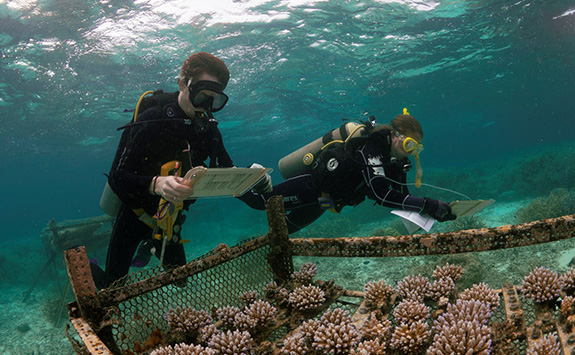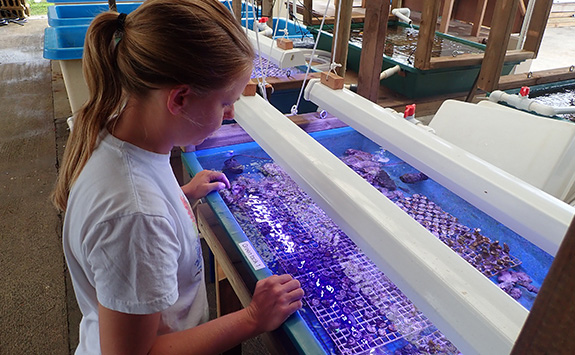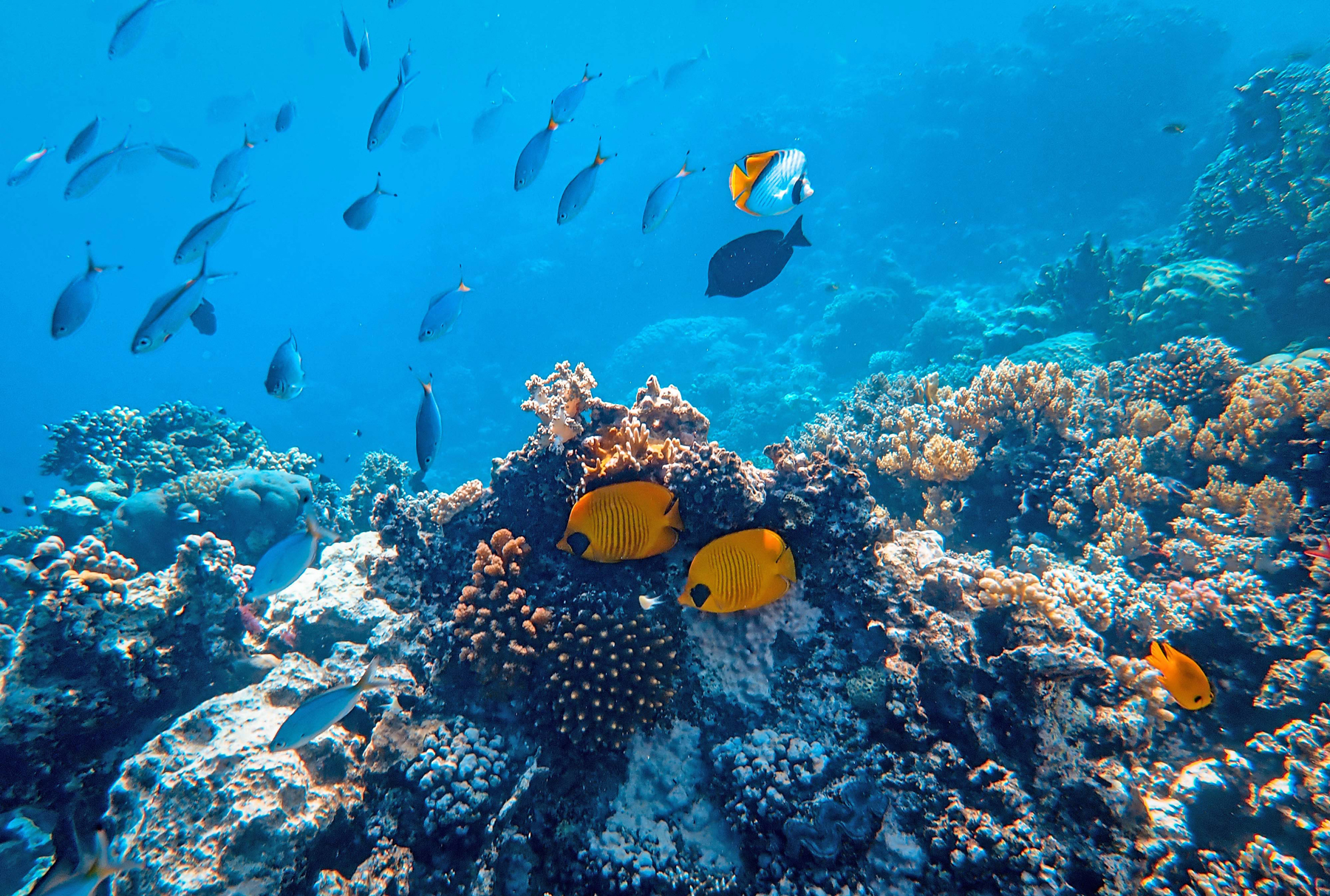Speeding up coral evolution to create climate-resilient reefs
Written by Jelaine Gan & Sheena Davis
12 February 2024
In a wrap
- Climate change is changing the structure and ecology of coral reefs due to rising sea temperature.
- Selective breeding can help speed up evolution of corals that can tolerate warmer waters.
- Dr. Adriana is working with national and international partners to find 'win-win' situations for coral reefs and people, through innovative appraches such as coral nursery tourism.
- The difficulty of finding PhD funding almost made her give up science, but she persevered to become the successful coral scientist she is now.
Growing up beside the ocean, Dr. Adriana Humanes fell in love with coral reefs at a young age, sparking a passion that has fuelled her research career for 20 years and counting. Her interest in the coral world has made her cross oceans multiple times – from her home in Venezuela to Australia for doctorate studies and then to England, where she currently serves as a Research Associate at the Coralassist Lab based in Newcastle University.
Climate change is the one of the most important threats to coral reefs. Already, we are witnessing catastrophic coral bleaching and mortality globally. In this, Adriana is trying to understand the adaptive potential of corals under current and future climate scenarios. While her study sites are primarily on the Pacific region, she and her colleagues ask broad questions that can potentially be applied to reefs in other parts of the world.
Crucially, she wants to know, with reefs now finding themselves in hot waters due to rising sea temperatures, will they adapt in time or face irreversible decline? With the likelihood of corals adapting to future warming, can humans help corals face warmer oceans?
Assisted evolution of corals
The climate on Earth has changed a lot over geological time, and species have evolved in tandem with these changes to become the species we see now. However, climate change has resulted to increased frequency and intensity of heatwaves, and an overall increase in sea temperature. It seems like there is just not enough time for corals to adapt by natural selection. But what if we can speed up evolution to give corals a fighting chance?
Assisted evolution refers to interventions and strategies that intentionally enhance the adaptive capacity and resilience of coral populations to various threats, particularly those associated with climate change. Together with the CoralAssist lab, Adriana explores methods such as selective breeding for adaptive traits – matching individuals that are doing well to produce offspring that have above-average heat tolerance. Even if climate action suddenly becomes effective in the next few years, the effect of climate change will still be felt by reefs for an extended time. These heat-tolerant corals might just buy them more time.

Adriana collaborates extensively with local and international researchers in her work. In the UK, her lab’s partners include Derby University, Exeter University, and the Horniman Museum and Gardens in London. The equally impressive list of international collaborators includes prominent universities in Australia, Germany, Indonesia, Philippines, the Palau International Coral Reef Centre, and government institutions, among others. Currently, she is starting a collaboration with an Australian environmental organization on a coral nurture program to outplant corals with the tourism industry. In Palau, she has proposed to work with the government in designing the management policies for coral reefs and apply six years’ worth of research that they have done in the island.
Building ecosystem resilience
Adriana believes that we need to become more pro-active in our conservation actions for coral reefs. Current management practices, she reckons, are not designed to deal with future stressors. Given that we can somehow predict future climatic conditions, she wants management options that can make these ecosystems resilient.
However, this will require building up three levels of resilience according to her. First is ecosystem resilience, including strategies under the adaptive evolution approach. Secondly, the communities relying on the coral reefs also need to be resilient, because the ecosystem services provided by the reefs will ultimately change. Third, the governance of ecosystems needs to be flexible to incorporate alternative management strategies that can guarantee ecosystem services and functions under global stressors like ocean warming.
She shared some examples of how management can provide benefits to local communities while at the same time reducing pressures on the reefs. For one, fishermen can be hired to manage coral nurseries and to conduct coral transplanting as an alternative livelihood. Interestingly, research has found that young corals grow much faster when in the company of sea urchins, as the later prevents algae from overgrowing on the corals. Applying this, coral nurseries, aside from providing planting stocks for restoration activities, can also farm sea urchins, speeding up coral growth and providing another source of income for the community at the same time.
Lastly, the third actor that needs to be resilient is the government. It should be able to change according to the situation and exhibit flexibility in terms of governance framework. Moving corals from one place to another, an often tricky and debated action, can only be possible if the government allows it.
These three levels of resilience are needed for a resilient system. She stressed the need to explore options on how to make this happen - improving the adaptive potential of the organism, the resilience of people and the government.
Being from Venezuela, I found it really hard to get access to resources and journals. It's only recently in the last 10 years that everything is now available on the Internet. When I was studying in Venezuela where I did my undergrad and masters, I had to go to the only scientific library with access to journals, and it was one hour away from the capital, which limited access to researchers. That has changed now that everything is available on the Internet. I think, for developing countries, getting access to the resources is really different from what we have in countries that are in much better situation.
Another thing is the challenge of getting a scholarship for PhD. It took me 6 years to get a scholarship for PhD, which I did in Australia. Definitely, getting a scholarship changed the whole panorama because I was about to drop academia completely. I had already enrolled into a photography course, and I did photography for one year. Exactly one week before leaving for Spain to attend a photography course, I got the acceptance letter for the scholarship.

The PhD opened so many doors. Being overseas, and in a country with resources to go to the reef, which is always expensive, opened a lot of opportunities. It connected me to researchers that had the time and resources to focus on their science. I also learned to be more confident – confirm that what I have done is correct, that I could write a paper, and start collaborations and exchange ideas with other researchers.
What are your predictions for your field in the future?
From the human perspectives, it's negative one, because we're going to lose some of the services that the ecosystems provide to communities that depend on them. Also, I think the way we are thinking of the final outcome is from a really anthropogenic and selfish perspective – we care about conserving species and ecosystems because they give us services. That's the main reason why we care about them.
In terms of the future for coral reefs, I think there's no positives or negatives. They always find an equilibrium in evolutionary times. They're just gonna change, and they're gonna reach another equilibrium. The way they are structured, their function, the biodiversity are gonna change from what they are now and how we know them. But I don’t think they're not gonna disappear. They're just going to be different, probably with less biodiversity and cover, in states that we consider degraded.
In the end, it depends on us, 100%. We are the ones causing the degradation. It's not just about being brave enough to stop the stressors (climate change). At the moment, the main emissions come from fossil fuels, but there's no other way that the world we know today can run without fossil fuels. There are so many people that live because of it. We depend on it economically, and we depend on it to function as a society. Everybody wants to reach a higher standard of life and that is the ideal for the people. Why can somebody reach a high and comfortable lifestyle level and not others? Are we gonna tell others, ‘No, you cannot reach it’ after we have reached it? The future seems uncertain and uncomfortable to many, but I think we need to be hopeful and continue trying to do our best in what we do and are, as researchers, academics, members of our families and communities, as citizens. In the end, we are deciding how our future looks like and we have the tools to produce positive changes to avoid the ecological collapse of ecosystems.
